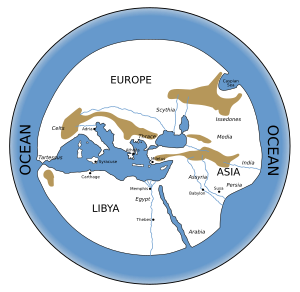Hecataeus of Miletus facts for kids
Quick facts for kids
Hecataeus of Miletus
|
|
|---|---|
| Born | c. 550 BC |
| Died | c. 476 BC (aged 74) |
| Scientific career | |
| Fields | History and geography |
Hecataeus of Miletus was an early Greek historian and geographer. He lived around 550 BC to 476 BC. He was born in Miletus, a city that is now part of Turkey. Hecataeus was known for his travels and his writings about the world and ancient family stories.
Contents
Hecataeus's Life and Travels
Hecataeus came from a very rich family. He lived in Miletus when it was under the rule of the Persian Empire. This area was called Lydia. He was active during the time of the Greco-Persian Wars. These were big conflicts between the Greeks and the Persians.
After traveling a lot, Hecataeus returned to Miletus. He held an important position in his city. He spent his time writing books about geography and history.
When Aristagoras, the ruler of Miletus, wanted to start a revolt against Persian rule, Hecataeus tried to stop him. He warned his people that it was a bad idea. In 494 BC, the Ionians lost the fight. Hecataeus was one of the people sent to talk to the Persian leader, Artaphernes. He convinced Artaphernes to let the Ionian cities keep their own laws.
Hecataeus was the first Greek historian we know of. He was also one of the first writers to mention the Celtic and Illyrian peoples. Many people call him the "Father of Geography."
Hecataeus's Important Writings
Hecataeus wrote two main books. One was called Periodos ges, which means "Journey round the Earth." The other was called Genealogiai, or "History." Sadly, only small parts of these books still exist today. These small parts are called fragments.
Periodos ges: A World Survey
Periodos ges was a detailed geography book. It had two parts. The first part was about Europe, and the second part covered Asia and Africa.
The book described a journey around the world. It started at the Straits of Gibraltar and went all the way around the Mediterranean and Black Sea. It also described the Atlantic coast of Morocco. Hecataeus wrote about the people and places travelers would see on such a trip. He also included information about people living on different Mediterranean islands. He wrote about the Scythians, Persia, India, Egypt, and Nubia. We still have over 300 small pieces of this work. They are often quoted in other ancient books.
Genealogies: Stories of Ancient Families
Hecataeus's other book was about mythography. This means it was about myths and ancient stories. It had four parts. In this book, Hecataeus looked at old stories about families who said they were related to gods. He used a more careful and questioning approach to these tales.
One famous sentence from this book still exists: "Hecataeus of Miletus thus speaks: I write what I deem true; for the stories of the Greeks are manifold and seem to me ridiculous." This shows he thought some Greek stories were not very believable.
The historian Herodotus tells a story about Hecataeus visiting an Egyptian temple in Thebes. The priests there showed Herodotus many statues. Each statue was of a high priest from a different generation. Herodotus said Hecataeus had seen the same statues. Hecataeus had told the priests that his own family went back sixteen generations to a god. The Egyptians compared his family tree to their own. They had 345 generations of priests, all normal people. So, they did not believe Hecataeus's claim about a god in his family. This meeting with the very old history of Egypt helped Hecataeus realize that oral stories might not always be true.
Hecataeus's World Map
Besides his books, Hecataeus also helped improve maps. He is known for making a better version of a map created by Anaximander. This map showed the world as a flat disc surrounded by a great ocean.
Why Hecataeus Was Important
Hecataeus was likely the first writer to try to create a serious history in prose, which means in regular sentences, not poems. He was also one of the first to try to tell the difference between myths and real historical facts. Even though he sometimes believed poets like Homer, he used a critical way of thinking.
Herodotus, another famous historian, learned a lot from Hecataeus. Herodotus used Hecataeus's idea of writing history in prose.
See also
 In Spanish: Hecateo de Mileto para niños
In Spanish: Hecateo de Mileto para niños
 | Roy Wilkins |
 | John Lewis |
 | Linda Carol Brown |


